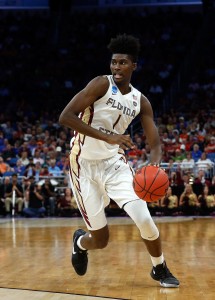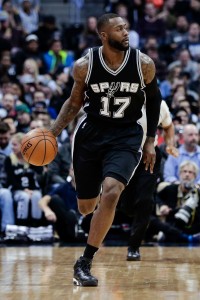No NBA teams replaced head coaches this offseason, but Orlando was one of several clubs to make changes to its basketball operations department. The Magic had been patient with general manager Rob Hennigan, watching as he made incremental improvements over the course of his first four years with the franchise, increasing the club’s win total from 20 to 23 to 25 to 35. After a series of major moves failed to pan out, however, the Magic slipped back to 29-53 in 2016/17.
With no playoff berths or star players to show for five years of work in Orlando – and an embarrassing dry-erase board incident fresh in everyone’s mind – Hennigan was a goner. To replace him, the Magic brought in Raptors executive Jeff Weltman to run the basketball operations department, and poached John Hammond from the Bucks to become their new GM.
In his fifth year, Hennigan clearly felt the pressure to make win-now moves, which resulted in overpays for players like Serge Ibaka and Bismack Biyombo. The new management group won’t be under the same sort of pressure — this roster isn’t capable of legit contention in the short term, which means Weltman and Hammond can be patient and focus on longer-term moves.
Both of the Magic’s new executives showed a willingness in their old jobs to gamble on young, athletic prospects with high upside. So far in Orlando, they’ve exhibited that same tendency. Not all of those moves will pan out, but with the Magic still going through a rebuild, Weltman and Hammond will likely be happy to roll the dice on a few Bruno Caboclos if the process eventually leads them to a Giannis Antetokounmpo.
Key offseason losses:
Considering the new front office had no attachment to most of the players brought in by the old regime, it came as no surprise that everyone with a non-guaranteed contract for 2017/18 was waived over the summer. Of that group, Marcus Georges-Hunt, Patricio Garino, and Stephen Zimmerman were young players who didn’t play much for Orlando last season, but C.J. Watson was the team’s primary point guard for most of last season.
Still, the Magic’s decision to move on from Watson made sense — he struggled mightily during his two years with the team, posting a shooting line of .371/.301/.867 in 95 total games. His $5MM salary was only partially guaranteed for $1MM, so releasing him gave the team an extra $4MM to use in free agency.
Speaking of free agents, the Magic also didn’t appear to make a strong effort to re-sign two veterans whose contracts expired. Jodie Meeks only appeared in 36 games for the team last season but was an effective outside shooter when he did play, making 40.9% of his three-point attempts.
Meanwhile, Jeff Green also spent just one season in Orlando, setting new career lows in several categories, including FG% (.394) and 3PT% (.275). A look at his year-to-year salary reflects how much his value slipped during his single season with the Magic — he signed for $15MM a year ago, and settled for the veteran’s minimum this offseason. Letting him walk shouldn’t negatively impact the Magic.
Key offseason additions:
Many of the top picks in June’s draft looked like ideal marriages between players and teams, and that was especially true of the Magic’s selection of Jonathan Isaac. Widely considered one of the more intriguing and athletic young prospects in the 2017 class, Isaac looks like exactly the sort of project that appeals to Weltman and Hammond. It’s not clear yet exactly what position he’ll play, or how long it will take him to develop into a reliable contributor, but the Magic have plenty of time to figure it out.
On the free agent market, the Magic mostly opted for veteran stability over youth and upside, though their investment in Jonathon Simmons was an interesting one. Simmons began the offseason as a restricted free agent, and was expected to attract significant interest after flashing some two-way potential in the playoffs following Kawhi Leonard‘s injury. However, the 28-year-old lingered on the market longer than anticipated, and eventually asked the Spurs to withdraw his qualifying offer, making him unrestricted. The Magic quickly swooped in and locked up Simmons at the very reasonable price of $6MM annually, with only two fully guaranteed seasons.
Simmons’ 2016/17 regular season stats – including a shooting line of .420/.294/.750 – weren’t overly impressive, but even if he doesn’t live up to the promise hinted at in the postseason, his cost will never become exorbitant. If he still has room to improve, he could end up turning into a bargain for the Magic, who figure to use him a more expanded role than the one he saw in San Antonio.
Outside of Simmons, the Magic also used their cap room to sign point guard Shelvin Mack, shooting guard Arron Afflalo, and big man Marreese Speights. None of those players figures to be part of the long-term plan in Orlando, but Mack could represent an upgrade at the backup point guard spot, and the Magic know what they’re getting from Afflalo and Speights, who will play rotation roles and provide some veteran leadership in the locker room.
Outlook for 2017/18:
In a weakened Eastern Conference, a playoff spot isn’t necessarily out of reach for the Magic, if everything breaks right. But that shouldn’t be the expectation — or even the goal.
In their first year with the franchise, Weltman and Hammond should be focusing on identifying which players are keepers and which ones are expendable. Guys like Aaron Gordon and Elfrid Payton, who are both already eligible for extensions this offseason, haven’t fully lived up to their potential so far, so it will be interesting to see whether Orlando holds off on new deals for the duo, opting to assess their play in their respective contract years before deciding whether to invest. Mario Hezonja is another lottery pick who has underperformed early in his NBA career, so 2017/18 should be a big year for him too.
With a focus on player development, the Magic will likely consider the season a success if a handful of those young players – including rookies Isaac and Wesley Iwundu – make positive strides, even if the club misses the postseason for a sixth straight year.
Salary information from Basketball Insiders used in the creation of this post. Photos courtesy of USA Today Sports Images.

